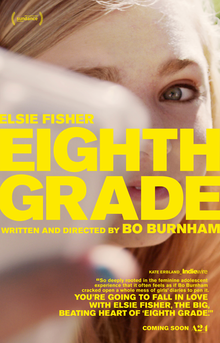
This one percolated to the top of my lists due to its many rave reviews and the awards it won. But after only recently watching Sixteen Candles, it also makes for a fantastic counter-example of how get a film about an adolescent girl right, a claim made by no less an authority than Molly Ringwald herself. This director Bo Burnham’s directorial debut and it seems apropos to our times and this film that he first made his name as a YouTubber himself.
Kayla Day is an eighth grade student who is nearing the end of middle school and is glad for it as she has had a terrible time. She lacks the confidence to socialize with others and as a result has no friends. She makes YouTube videos giving advice on tips on how to be more popular but is unable to follow any of it herself. As a result, she spends most of her time following social media on her phone, living vicariously through the exploits of others. When a popular girl in school reluctantly invites her to a party, she has an anxiety attack and is unable to fit in. She has a crush on a boy in school who she finds attractive and persists in her affections even after being warned that he is an asshole. When her class is sent to visit a high school and she is assigned a senior student, she eagerly latches on to her as a new friend and joins in when she hangs out with her high school friends.
Right away it’s easy to see why all of the critics loved this film. With its protagonist being a fledgling YouTubber who persists despite having no views and a school full of teenagers glued to their phones, it’s hip and topical. There’s even a scene in which the popular girl Kennedy dismissively rolls her eyes saying that no one actually uses Facebook anymore. It’s also a post #MeToo film, what with the popular hot guy being depicted as a creepy perverted asshole and how the naive Kayla in her eagerness to make friends is easily taken advantage of. Best of all is that it shows Kayla as an imperfect teenager: slightly chubby so as to feel awkward about being seen in a swimsuit, a face full of zits that get worse when she stays up all night on her phone and stilted speech from being anxious whenever she has to speak to other people in person. Even worse is her desperate need for acceptance which pushes her into actions that make us cringe on her behalf. It’s a deliberate move to deglamorize the reality of growing up as an adolescent and as such feels wonderfully fresh and grounded.
There is a sense that the film might just be a little too realistic and not enough of note happens. I also feel that they ought to do something more about the social media addiction as that is just left hanging. Maybe have Kayla realize that trying to look good on Instagram doesn’t translate to more real-life friends. But then there are no easy answers in life and you can’t really learn how to socialize from YouTube videos either. As Kayla tells herself, if things don’t work out then you can just wait to move on to the next stage in life. I love the attention to detail here and how everything fits together. It isn’t explicitly said in the film but one reason why Kayla has difficulties fitting in might be her lack of a mother and siblings growing up. This is a film really did need to be made and as Ringwald noted, it’s the perfect counter-point to depictions of teenaged life as some glamorous lifestyle when in reality growing up is all about constantly feeling insecure about who you are and trying to find your own way.